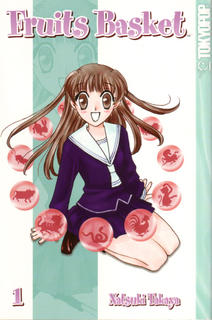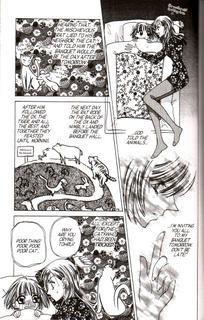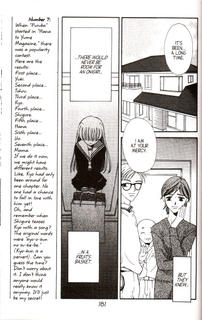Fruits Basket, Volume 1
 If you're a manga reader, Fruits Basket needs no introduction. It is a sales powerhouse that is redefining the concept of "dominating the charts" with each new volume only being unseated from the top spot by it's successor. What's more remarkable than it's sheer volume of sales is that this huge success is coming from a very intimate, heartfelt work of art.
If you're a manga reader, Fruits Basket needs no introduction. It is a sales powerhouse that is redefining the concept of "dominating the charts" with each new volume only being unseated from the top spot by it's successor. What's more remarkable than it's sheer volume of sales is that this huge success is coming from a very intimate, heartfelt work of art.
In my previous manga posts, I don't think I've ever mentioned the manga-ka, perhaps because I didn't feel their influence so strongly. Fruits Basket is a much more personal expression than any manga I've read so far, and is clearly a labor of love for it's manga-ka, Natsuki Takaya. There are short text pieces in each chapter: the "Ultra Special Blah Blah Blah" where she usually comments on the book itself, and a sidebar where she discusses her life - mainly where she is in the videogames she's playing lately. It gives the same feeling you get from a good American Indy comic - a strong personal vision that is being shared between you and a very immediate creator. Matt Fraction and Joe Casey recently discussed Stan Lee's "voice" in the early Marvel books, and if it could still work today. What Takaya's doing here is wildly different from Stan's outre hyperbole, but it accomplishes exactly the same result of a close identification with the author, and feeling like you've been invited into something grand. It's not only in the writing that Takaya reveals herself, but in the unique flavor of her art. While it generally follows what would be considered a manga style, it has wild explosions into experimental, expressive art that breaks expectations but communicates both story and emotion. From postmodern footnotes commenting on the characters in the scene, to wild exaggerations of art when the characters are fighting, to unique styles in childhood flashbacks ... it all speaks to an artist who cannot be held down by genre. While she is coming from a manga tradition, she is not bound to it. Much of the art would feel right at home in a self-published independent comic in America.
It's not only in the writing that Takaya reveals herself, but in the unique flavor of her art. While it generally follows what would be considered a manga style, it has wild explosions into experimental, expressive art that breaks expectations but communicates both story and emotion. From postmodern footnotes commenting on the characters in the scene, to wild exaggerations of art when the characters are fighting, to unique styles in childhood flashbacks ... it all speaks to an artist who cannot be held down by genre. While she is coming from a manga tradition, she is not bound to it. Much of the art would feel right at home in a self-published independent comic in America.
Fruits Basket itself is sort of a beautiful manga dichotomy: it's got all the cute animals, big eyes, and short-skirted schoolgirls that those dismissive of the genre point to ... but it's got the deep, abiding emotional lives of the characters that fans love. On it's surface, it's shojo at it's most ... shojo: Unloved yet optimistic schoolgirl moves in with a family hiding a dark secret (when hugged, they turn into zodiac animals) and finds her heart torn between the Bad Boy and the Angelic One. As I've said before, I can't believe I'm reading this. I am a man who likes manly things like football, beer, and The Ultimates ... but when I head to 2005 Will Eisner Spirit of Comics Retailer Award Winning Night Flight Comics today, I'll probably pick up Volume 2, then rapidly devour the rest as I can afford them. The characters are so deep and engaging that there's an electric connection with them in every panel. They are all initially presented as stereotypes (which correspond to their zodiac animal), but they quickly grow far beyond that. Though they are animals, they are profoundly human. Fruits Basket constantly swings from soap opera to slapstick, and all the wild hijinks work because the characters are always at the fore. Like the best of television, you keep coming back for episode after episode because you care about what happens to them, and enjoy being in their company.
I thought perhaps writing this would let me dissect and analyze what Takaya is doing with her characterization in Fruits Basket, but I find I'm still at a loss. I can't put my finger on why I like this odd little book so much, and why I care about Tohru, Kyo, Yuki and Shigure. It's storytelling magic that goes beyond tricks of the trade and proves that a singular artistic vision can sell.

8 comments:
Hey!! Lovely post on Fruits Basket! I've never been a huge fan of shoujo manga, and I thought FB was a bit too cute for my tastes (my tastes would probably be similar to YOURS!), but now that I've read this I think I ought to pick it up too. :D
But anyway, I'm here to reply to your post on my LJ. :D I've still to read your blog post that you've mentioned, but I'll look for it.
I've touched on this a bit in a blog post I did a bit ago, but I think the looser style of manga is simply more expressive that Western naturalism. It is able to say much more about the character's emotional lives than pure naturalism. I often have theatre analogies, considering that's my background: Shakespeare's a bloody poor naturalist - people don't speak in strict pentameter - but he communicates artistic truth much more than 100 naturalists like Miller or Williams.
I think McCloud's 'recieved/percieved art' plays a role here. The more detailed and naturalistic the figure, the more it is "other" and we look at it from the outside. A simpler, more iconic figure encourages identification. Could Yotsuba even work if she looked like a "real" toddler?
I remember Scott McCloud's book - I read it and really thought his points valid. I wasn't thinking about his book when I wrote the essay I did, but then it's fairly true. For my essay, I was more thinking of the SOCIAL aspect of manga art, and how it ropes people in at a SUPERFICIAL level, rather than at an internal, identification level. On both levels, manga art seems to score a jackpot.
And Yotsuba wouldn't have worked if she was portrayed as a real toddler, though there ARE manga out there who draw REAL toddlers and they're nowhere near as cute as Yotsuba. That can't be helped though... naturalism brings another problem - the fact that reality can often be rather... ugly. Not just metaphorically, but in terms of superficial appearance.
I know for sure SOOOOO many manga stories would TOTALLY not work if it weren't for the simplified art. It helps in everything from forgetting about reality to suspending your disbelief. In the comics world, at least, it's amazingly helpful.
Queenie -
I definitely was not expecting to like Fruits Basket. My manga reading is new and limited, but I was expecting to be more interested in things like Battle Royale and Uzumaki ... instead, I find myself all over Yotsuba and Fruits Basket.
Livejournal for some reason comfuses me ... I don't even know if I can use HTML in comments there, so I didn't link to my post. The post I was referring to - about the emotions of manga vs. Western is this:
http://fossen.blogspot.com/2005/08/decompression-and-battle-royale.html
Your "Flipped" review on it was so good ... that's what got me to try it. Gotta say, your "Seven volumes in, I know better" gave me pause.
But I hit that mark maybe 70 pages in. :)
I saw the first one or two episodes of the anime a year or so ago and it didn't really hit me, but it sounds like this is a series that creeps up on you. I'll have to give it a shot one of these days.
Since you say you liked the impressionistic elements of the art, one series to check might be Swan from CMX. I won that in Tangognat's contest and really loved it.
Is a classic series on ballet (set during the beginnings of ballet in Japan). The manga-ka accomplishes the impossible task of drawing two people competing against each other doing the exact same dance. Not by showing each move, but by these crazy montage spreads which represent the feeling of their dancing.
I'm also liking the combo of over the top emotion mixed with some interesting characters. Like at least in the first book the forms of rivalry and support are more nuanced than one would expect.
Can get some idea of the art from here.
Then again, maybe ballerinas is asking too much..haha. Paradise Kiss has some pretty nice character relationships in it.
For shonen stuff, you may want to check out GTO, the story of a bike gang guy who decides to become a teacher, initially to pick up girls. But when it comes down to it, his own heart gets the better of him and he uses very unorthodox methods to connect to the kids. Pretty funny and tackles some serious issues at times..
But I'm loving Yotsuba&. Very heartwarming stuff. Cardcaptor Sakura has a bit of that innocent feel to it as well. If you don't mind reading online, you may want to check out Yokohama Kaidashi Kikou, the most soothing post-apocalyptic comic I've ever seen. :)
Anyway, sorry for rambling!
Shawn
Also.. Planetes might be a good one to check out, involving debris collectors in space. Lovely artwork and very interesting characters. Tends to reignite any love of space you had as a kid.
For Battle Royale, I haven't read the manga (I've heard Giffen took a lot of liberties with the english adaptation), but if you ever feel like giving the story another shot, the novel has been translated. That's the original form of BR and gives a lot of space to the characters.
Whoops.. I just looked back at the Yotsuba thread and see that I'm repeating myself a bit (with the Planetes mention). I need to read your blog more often. :)
Fruits Basket is a series which gets better and better as it goes along. The early volumes start to get repetitive for a while as the various Soumas keep getting introduced, but once the cast are all in play, things begin kicking up to higher gear. The manga-ka is not afraid to really send people through emotional hell and their reactions are generally pretty believable.
And the cast's attempt to do Cinderella with Hanajima as Cinderella and Tohru as the wicked stepsister is truly classic.
Swan is something I'm sure to look into at some point - my five-year-old daughter's an aspiring ballerina, so it might be fun to read together when she's a touch older.
I absolutely nees to try Planetes. I am trying to spare some of my comic budget for a manga order from jostmanga.com ... and Planetes is top of the list.
Post a Comment